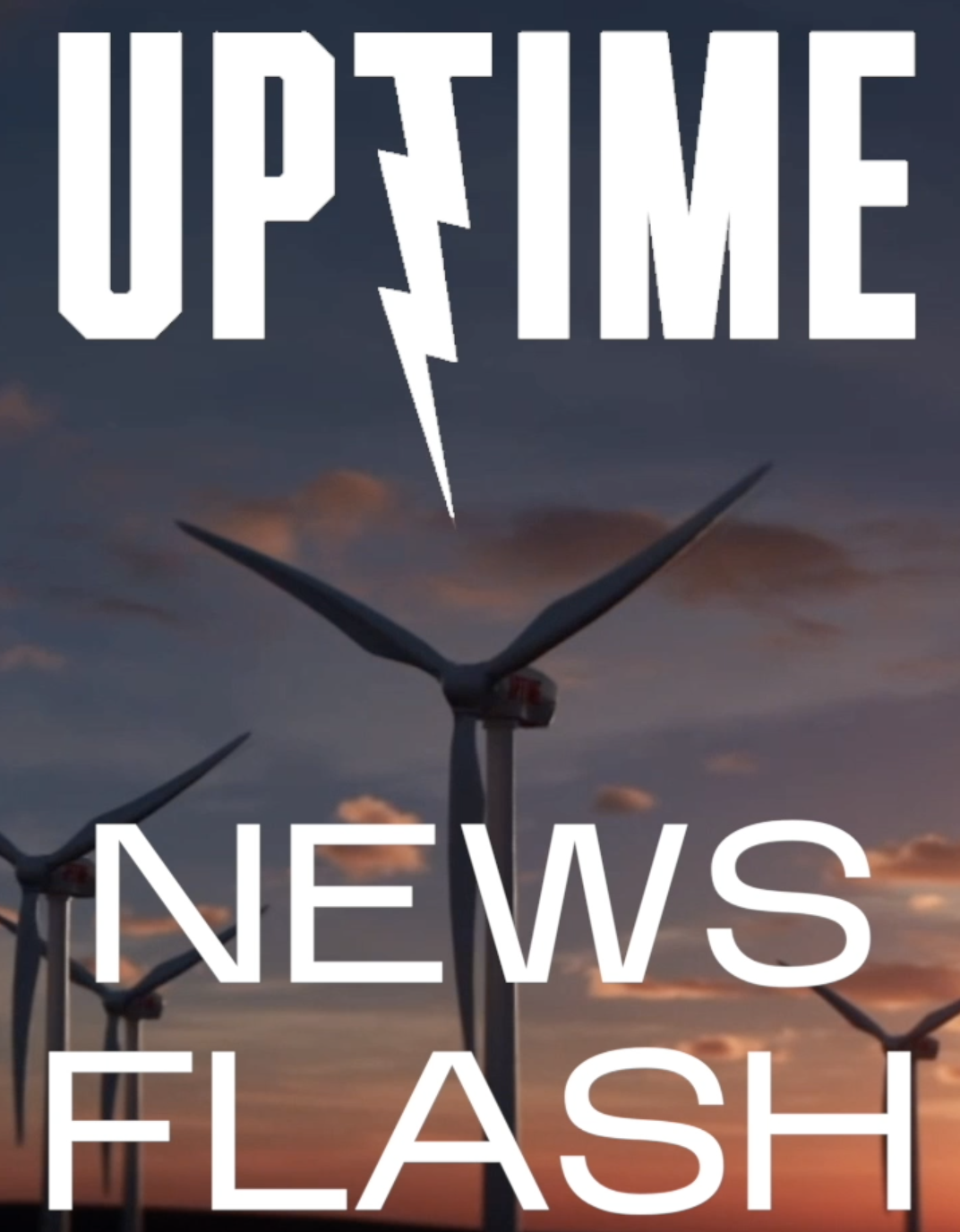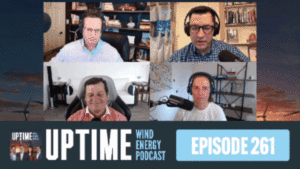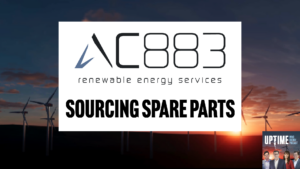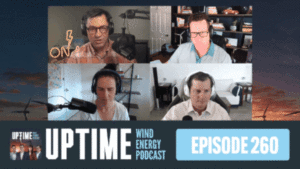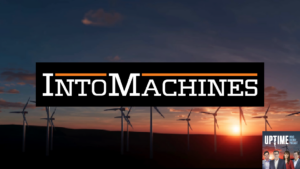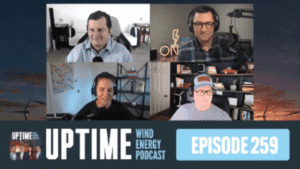In this News Flash: Engineering firm PD&MS has been acquired by RSK, Total Energies takes full ownership of Total Eren, and opponents of offshore wind projects in New Jersey are suing Orsted over $1 billion in tax breaks.
Pardalote Consulting – https://www.pardaloteconsulting.com
Wind Power LAB – https://windpowerlab.com
Weather Guard Lightning Tech – www.weatherguardwind.com
Intelstor – https://www.intelstor.com
Podcast: Play in new window | Download
Sign up now for Uptime Tech News, our weekly email update on all things wind technology. This episode is sponsored by Weather Guard Lightning Tech. Learn more about Weather Guard’s StrikeTape Wind Turbine LPS retrofit. Follow the show on Facebook, YouTube, Twitter, Linkedin and visit Weather Guard on the web. And subscribe to Rosemary Barnes’ YouTube channel here. Have a question we can answer on the show? Email us!
News Flash – 30 July 2023
Allen Hall: I’m Allen Hall, President of Weather Guard Lightning Tech, and I’m here with the Vice President of North American Sales for Wind Power LAB, Joel Saxum and the founder and CEO of Intelstor Phil Totaro, and this is your News Flash, Aberdeen based engineering firm PD&MS has acquired, been acquired by RSK, a global leader in sustainable solutions, PD&MS has been operating since 2002 and expanded with Synergy Environ and Optimus joining in 2021 and 2022, respectively.
The company serves prominent names in the energy industry like Vattenfall and Seagreen Offshore Wind Project. This is a merger of engineering companies. It seems like every engineering company, is involved in any offshore or global business, right at the moment is trying to grab another engineering business to make themselves more powerful.
Phil Totaro: Yes. This makes two weeks in a row that we’ve been talking about this. But it’s also interesting to note too, you know, how involved both companies are in,,insurance advisory as well. This was probably not necessarily highlighted in in. What they put out publicly, but they, both companies have actually done a lot with, UK insurance companies.
in particular in underwriters. So I, I think everybody that’s involved in the offshore wind value chain just wants to understand what the emerging risks are, a lot better than, than what they currently do. So I think this, this makes sense and the consolidation is likely to continue.
Joel Saxum: To follow on with what Phil’s saying there with the insurance industry is you have London.
The reason London has is making money and always has, it’s a financial center right. it’s like Singapore or, or New York. I mean, they, they produce things, but the really thing they produce is the movement of money. So London as a financial center is also where the London markets are. All of the insurance companies are there, but you also have a lot of bankers there.
So if there’s a, you know, and they, they drink beer at the same pubs. They hang out with the same people. So when you start listening to people, Oh, well there’s, there’s some financial companies here. There’s, there’s quite, to be honest with you, there’s quite a bit of dry powder sitting around in London that is looking at investing in, in renewables because they see it as the future, right?
You always follow the money. I. Um, so those, those same circles playing together, if you can see, hey, we should tie this person up or tie these people up, um, that’s how they’re creating these monster engineering groups and they’re gonna, this, this is gonna continue to happen. Total
Allen Hall: Energies has acquired full ownership of renewable energies, company total.
EEN increasing the state from approximately 30% to 100%. The acquisition evolves a net investment around 1.5 billion euros for total energies. Total EEN has about three and a half gigawatts of renewable capacity and operation worldwide. What the pipeline of over 10 gigawatts of projects in 30 countries.
Joel Saxum:, I think it’s a smart move by Total, Total, of course a big, uh, oil and gas giant that’s got assets all over the world. Um, however, Total Even has been their kind of, their little bit of renewables on the side, and they’ve got, I know they’ve got assets in Europe, for sure they’ve got some assets in South America.
Um, so a great move by the total, you know, management team to, to de-risk, A further jump into the renewable space because they’ve had this thing sitting there for like five years. They’ve, they’ve owned a portion of it, as Phil was saying here, off air, and now they’ve, they’ve just decided like, okay, it’s, it’s successful.
It’s working. It’s good. We’ve got a good pipeline. Let’s grab ’em and bring ’em into the group full-time. So
Phil Totaro: I like the move. What’s interesting about this is the fact that, companies in particular an oil and gas company that has kind of a separate renewables arm. Is actually folding it into their main business now because, you know, it’s, I guess, big enough for them to, to, to consider it, to be,, you know, part of the, the main corporation’s p and l as opposed to a separate division.
So it’s, it’s, interesting to note and that they’re doing it. Total has always been a very proactive company, um, in that regard. And I. I can foresee other companies, doing that as well moving forward. Maybe not right at this moment, other oil and gas companies, but, um, I think it’s, it’s a, it’s a good thing in general.
Allen Hall: Opponents of offshore wind projects are suing New Jersey and Orsted the Danish wind energy developer. For over $1 billion in tax breaks approved for the company in a recent change in, uh, New Jersey law. Now, the lawsuit was filed by two resident groups and three electricity customers from Ocean City who seek to overturn the law, claiming it benefits only one entity, and it is therefore illegal.
The state legislature passed a bill allowing Orsted to keep federal tax credits that were supposed to be passed on to rate payers. Which Orsted had promised to do when applying for permission to build the ocean win one project. Obviously Phil, a lot has changed since when that initial, bill has passed and when Ocean Wind 1 was, was beginning.
Interest rates are higher, inflation is high. The cost of the projects have skyrocketed. It’s makes sense for Ted to go to New Jersey and say, Hey, we need a little bit of relief. You’re taking all of the federal monies from us, which was fine at the time, but. Times have changed a little bit.
Phil Totaro: Yes. And it’s just the new reality that the market faces.
So from the commercial standpoint, you know, I can understand why the development companies is asking for this change to be made. Um, but this is also in the context of, um, you know, a lot of things that have happened with the Ocean Wind Project in the past. You know, Nine to 12 months. PSEG pulled out, which we’ve talked about before on the show.
You’ve had this whale death issue, which you’ve also talked about on the show, not actually related to wind, but doesn’t matter. It’s caused, and this now, this tax issue has caused, uh, a lot of public relations headaches for Orsted, um, as they continue down this, um, this pipeline. To try and, you know, get this project developed.
So it’s, it’s just kind of the wrong thing to happen at the wrong time.
Joel Saxum: Yeah, it, it’s very frustrating to see because it’s headwinds against what we wanna see for offshore wind. The Biden administration with, you know, the, the big plans of 30 gigawatts by 2030. I mean, it’s looking worse and worse and worse.
We’ve been talking about that for a few years now. and as proponents of. Wind generation, offshore, wind in general, and, and the in renewable energy transition. It’s not stuff that we like to see not happy.
Allen Hall: If you wish to learn more about the Ocean Wind One Project and Orsted’s involvement in it, reach out to Intelstor at intelstor.com.



